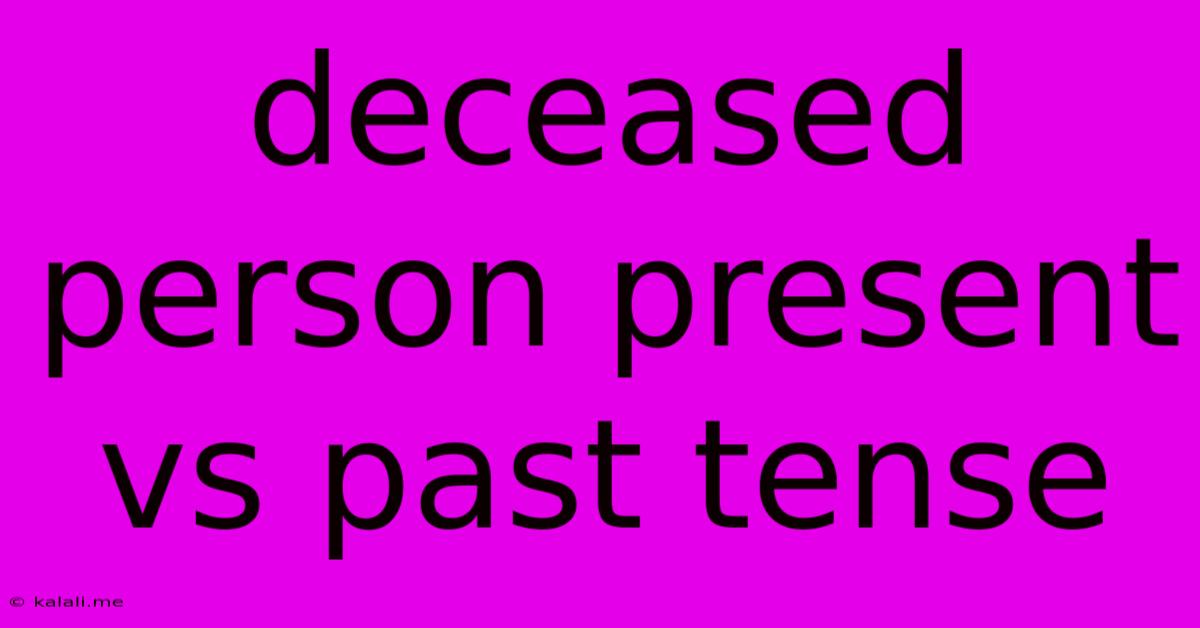Deceased Person Present Vs Past Tense
Kalali
Jun 11, 2025 · 3 min read

Table of Contents
Deceased Person: Present or Past Tense? A Guide for Sensitive and Accurate Writing
Choosing the right tense when writing about a deceased person can be tricky. It's a delicate balance between respecting the individual and maintaining grammatical accuracy. This article explores the nuances of using present and past tense when referring to someone who has passed away, offering guidance to help you write sensitively and correctly. The key is understanding context and intent.
Should you use the present or past tense? The answer isn't always straightforward, and depends largely on your purpose. There's no single "correct" answer; both tenses can be appropriate depending on the context.
Using Past Tense: The Most Common Approach
Generally, past tense is the most commonly accepted and safest option when discussing someone who has died. It accurately reflects the fact that the person is no longer alive and avoids any potential for misinterpretation. This is particularly important in factual accounts, biographies, or obituaries.
- Example: "John Lennon was a highly influential musician." This clearly and correctly states a fact about someone who is deceased.
Using past tense also works well when discussing the deceased person's accomplishments, personality, or relationships.
- Example: "She dedicated her life to charity and is remembered for her kindness." Here, the past tense emphasizes her actions and legacy.
Using Present Tense: Specific Circumstances
While less common, present tense can be appropriate in certain situations, particularly when the focus is on the enduring impact or legacy of the deceased.
- Example: "Shakespeare remains one of the most celebrated playwrights in history." This highlights Shakespeare's continuing influence, even though he's long gone.
Present tense can also be used in certain literary styles, like biographical essays that aim to bring the person to life through vivid description, making them feel present to the reader, even though they are deceased.
- Example: "He strides across the stage, his words electrifying the audience." (In a biographical essay about a famous actor). This use of present tense is stylistic and aims for dramatic effect, bringing the actor back to life momentarily through the reader's imagination.
When to Avoid Present Tense
Avoid using the present tense when discussing straightforward facts about the deceased. Statements like "Elvis is alive" are factually incorrect and misleading. Similarly, avoid present tense in formal contexts like legal documents or official records. Stick to the past tense for clarity and accuracy in these instances.
Considerations for Sensitivity
Regardless of the tense you choose, it's crucial to maintain a respectful and sensitive tone when writing about deceased individuals. Avoid sensationalizing their death or making inappropriate comments about their life or legacy. Always strive for empathy and understanding in your writing.
Examples of Appropriate Usage
Here are some more examples to illustrate the proper use of tenses:
- Past Tense: "My grandfather served in World War II."
- Past Tense: "Marie Curie revolutionized the field of science."
- Present Tense (for legacy): "Martin Luther King Jr.'s message of equality continues to inspire generations."
- Present Tense (literary/evocative): "The artist paints with vibrant colors, capturing the essence of the human spirit." (In a biographical context)
By understanding the nuances of tense usage and prioritizing sensitivity, you can ensure your writing accurately and respectfully portrays deceased individuals. Remember to carefully consider your audience, context, and purpose when making your decision.
Latest Posts
Latest Posts
-
Pros And Cons Of Judicial Activism
Jun 12, 2025
-
Which Of The Following Is A Parasite
Jun 12, 2025
-
What Is The Average Iq For A Child
Jun 12, 2025
-
Daughters In Law Or Daughter In Laws
Jun 12, 2025
-
Difference Between Animal Mitosis And Plant Mitosis
Jun 12, 2025
Related Post
Thank you for visiting our website which covers about Deceased Person Present Vs Past Tense . We hope the information provided has been useful to you. Feel free to contact us if you have any questions or need further assistance. See you next time and don't miss to bookmark.